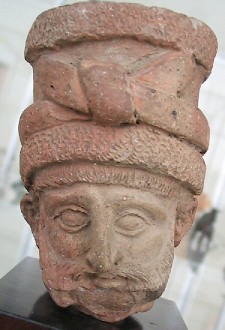Megabyzus (1)
Megabyzus (Old Persian Baghabuxša): Persian nobleman, one of the seven conspirators who killed the Magian usurper Gaumâta and helped Darius I the Great become king (September 522 BCE).

The most famous source of information about Megabyzus' role in Darius' accession is the second part of the third book of the Histories by the Greek researcher Herodotus (fifth century BCE).note That Megabyzus was involved in the killing of Gaumâta is confirmed by another source, the Behistun inscription; this inscription also tells us the name of Megabyzus' father, Dâtuvahya.
Herodotus adds that after the murder, the seven conspirators discussed the future constitution of Persia, and that Megabyzus argued that an oligarchy was the best way to govern the Achaemenid Empire. Otanes argued for democracy and Darius for monarchy.note Probably, there bas indeed been a discussion, but about another question: was Persia to have a centralized government or was it to be a loosely organized tribal confederacy?
The Athenian historian Xenophon (c.430-c.355) tells us in his vie romancée of Cyrus the Great that Megabyzus was satrap of Arabia, but this is extremely unlikely since the Arabs were never subject to Cyrus' rule.
According to Herodotus, Megabyzus had a son named Zopyrus who played an important role in the suppression of a Babylonian rebellion.note Two revolts are known (one led by Nidintu-Bêl and one led by Arakha) but it is impossible to fit Herodotus' story within the historical framework. Zopyrus' son was also called Megabyzus; he was one of the most important Persian commanders in the first half of the fifth century BCE.